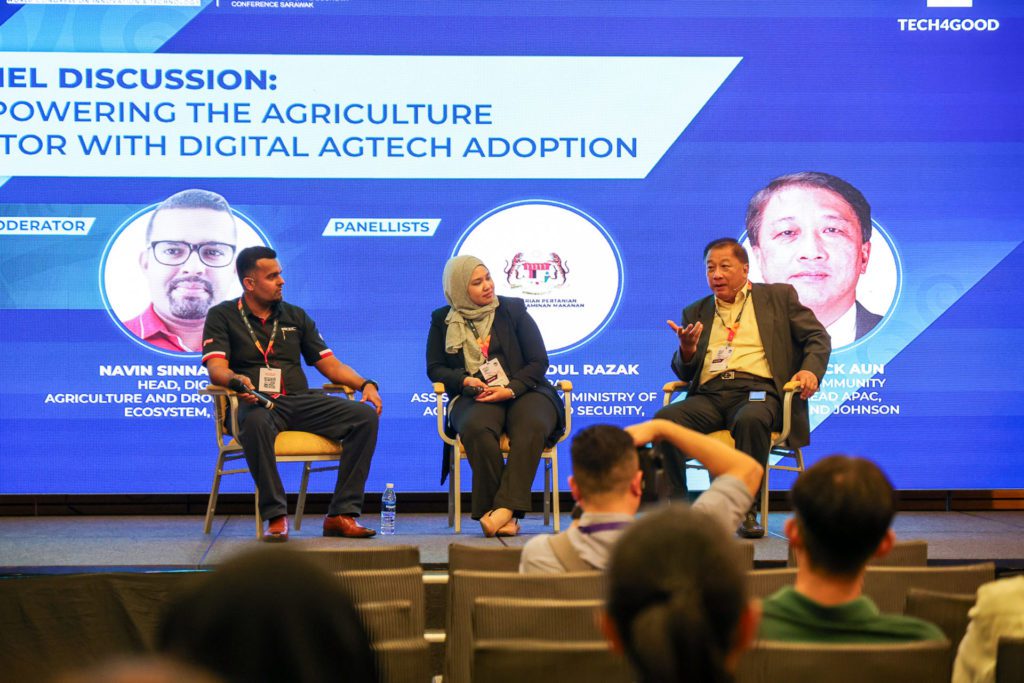
Malaysia Flying Labs at the World Congress on Innovation and Technology 2023
Malaysia Flying Labs participated in a panel discussion on Empowering the Agriculture Sector with Digital AgTech Adoption.
August 19th, 2024
On 4th October 2023, at the World Congress on Innovation and Technology 2023 in the City of Kuching, Malaysia Flying Labs participated in a panel discussion on Empowering the Agriculture Sector with Digital AgTech Adoption. The panel discussion brought together a distinguished group of experts: Navin Sinnathamby from the Malaysian Digital Economy Corporation (MDEC), Ministry of Science Technology and Innovation; Rohafiza Abdul Razak from the Malaysian Ministry of Agriculture and Food Security; and Khoo Hock Aun, AgTech expert at Malaysia Flying Labs and convenor of the Farm Robotics Working Group at the Flying Labs Network. The conversation centered around the transformative impact of digital technologies on agriculture, highlighting key strategies, challenges, and opportunities in the sector.
Navin Sinnathamby, representing MDEC, underscored the agency's pivotal role in spearheading Malaysia's digital transformation, particularly in agriculture. He elaborated on MDEC's various initiatives aimed at fostering a robust ecosystem for AgTech innovation. These initiatives include providing support to startups and entrepreneurs, facilitating access to funding, and promoting collaboration between tech companies and agricultural businesses. Navin emphasized the importance of leveraging data analytics, IoT, and AI to optimize farming practices, improve crop yields, and enhance resource management. He noted that digital tools are not just enhancing productivity but are also crucial in making agriculture more sustainable by minimizing waste and reducing the environmental footprint.
Rohafiza Abdul Razak discussed the Malaysian government's commitment to advancing digital agriculture. She highlighted key policies and strategic plans designed to support the integration of digital solutions into the agricultural sector. Rohafiza pointed out that the government recognizes the critical role of technology in ensuring food security, particularly in the face of challenges such as climate change, urbanization, and population growth. She emphasized the government's efforts to create a conducive environment for AgTech adoption, including regulatory support, infrastructure development, and capacity-building programs. Rohafiza also stressed the importance of public-private partnerships in driving innovation and scaling digital solutions across the agricultural value chain.

Khoo Hock Aun brought a technical perspective to the discussion, focusing on the role of robotics and automation in modern agriculture. He explained how advancements in robotics are transforming traditional farming practices by automating labor-intensive tasks such as planting, harvesting, and monitoring crop health. Khoo highlighted that robotics not only addresses labor shortages but also enhances precision in farming operations, leading to better resource use and reduced environmental impact. He shared examples of successful implementation of farm robotics, noting the potential for these technologies to significantly boost efficiency and productivity. Khoo also emphasized the need for continued research and development, as well as the importance of developing local expertise and talent in agricultural robotics.
The discussion concluded with a consensus on the necessity of a collaborative approach to drive the digital transformation of agriculture in Malaysia. The panelists agreed that achieving this vision requires the active participation of all stakeholders, including farmers, technology providers, researchers, and policymakers. They called for increased investment in digital infrastructure, more comprehensive training programs for farmers, and greater awareness of the benefits of AgTech.
The panelists also stressed the need for ongoing dialogue and cooperation to ensure that digital solutions are accessible and beneficial to all, including smallholder farmers.
In summary, the panel highlighted that the adoption of Digital AgTech is not just an option but a necessity for the future of agriculture. It offers a path to more sustainable, efficient, and resilient agricultural systems, capable of meeting the growing food demands while preserving natural resources. The insights shared by the panelists underscored a shared vision of a digitally empowered agricultural sector, poised to drive Malaysia's economic growth and food security into the future.
Location(s)
Recent Articles
View All »

Fixed-Wing, Rotary-Wing, and VTOL Drone Training with Japan Flying Labs
